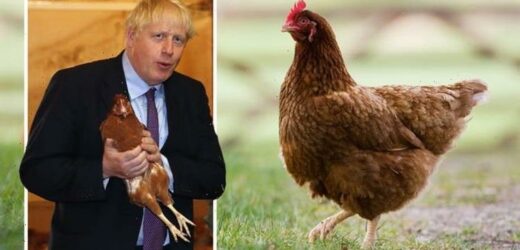Bird flu: WHO discuss the size of pandemic outbreak in 1997
We use your sign-up to provide content in ways you’ve consented to and to improve our understanding of you. This may include adverts from us and 3rd parties based on our understanding. You can unsubscribe at any time. More info
Early last month the UK was officially deemed free of avian influenza (bird flu), following a major outbreak of the disease last winter. Carried by birds of all shapes and sizes, at least four strains of the virus have caused health scares in the UK in the last 24 years. Just like the coronavirus SARS-CoV-2, bird flu has made the jump from animals to humans and thrives in environments like poultry farms where thousands of animals are in direct and close contact.
Christine Middlemiss, the UK’s Chief Veterinary Officer, warned in September the country needs to remain vigilant as “there is a constant risk of the disease returning” to our borders through wild birds.”
He added: “Poultry and captive bird keepers should maintain good biosecurity practises, such as cleaning footwear, feeding birds indoors, and minimising contact with wild birds.
“Building these simple actions into routines now will go a long way to limiting the risk of future outbreaks.”
A team of genetic researchers on the outskirts of Edinburgh, however, may have come up with a novel solution to the bird flu problem.


They are looking to modify the DNA of chickens to give them a genetic immunity to the bird flu virus.
The news follows Environment Secretary George Eustice declaring the UK would break away from European Union red tape regarding genetically modified plants and animals.
Genetic modification technology primarily targets crops to make them more resilient to poor weather conditions and diseases.
Researchers around the globe, however, are looking at ways gene-modifying Crispr technology could benefit the livestock industries as well.
Florida: Genetically modified mosquitoes released by Oxitec
There are, however, some concerns, which scientists will first have to address.
According to Professor Helen Sang head of the Division of Developmental Biology at the Roslin Institute of the University of Edinburgh, scientists need to ensure their experiments do not do more harm than good.
She told The Times: “If you’re introducing resistance to something like flu, you have to be sure that you will not have an unintended consequence – for example, causing the flu virus to mutate in a way that makes it able to impact people more easily.
“There’s a lot to think through on how you would implement something like this.”
There are presently four strains of the bird flu virus that are of concern: H5N1, H7N9, H6N6 and H5N8.


The first three strains don’t infect people easily and are not known to spread from human to human.
But as the Covid pandemic has shown last year, many unknown viral agents are still lurking in the wild, waiting for human contact.
Under EU rules adopted in 2001, genetically modified organisms or GMOs face stringent rules and regulations.
UK companies and researchers will now have an opportunity to exploit the market, free of the EU’s restrictive laws.
And the EU will want to overturn its bans if the bloc wants to keep up with the rest of the world, an expert has claimed.
Professor Cathie Martin at the John Innes Centre in Norwich said “European breeding companies will be easily out-competed by the countries that do allow gene editing”.
In his first speech as Prime Minister in 2019, Boris Johnson said British scientists have a chance to thrive in the field, building a better future for the world.
He said: “Let’s liberate the UK’s extraordinary bioscience sector from anti genetic modification rules.
“Let’s develop the blight-resistant crops that will feed the world.”
Source: Read Full Article

